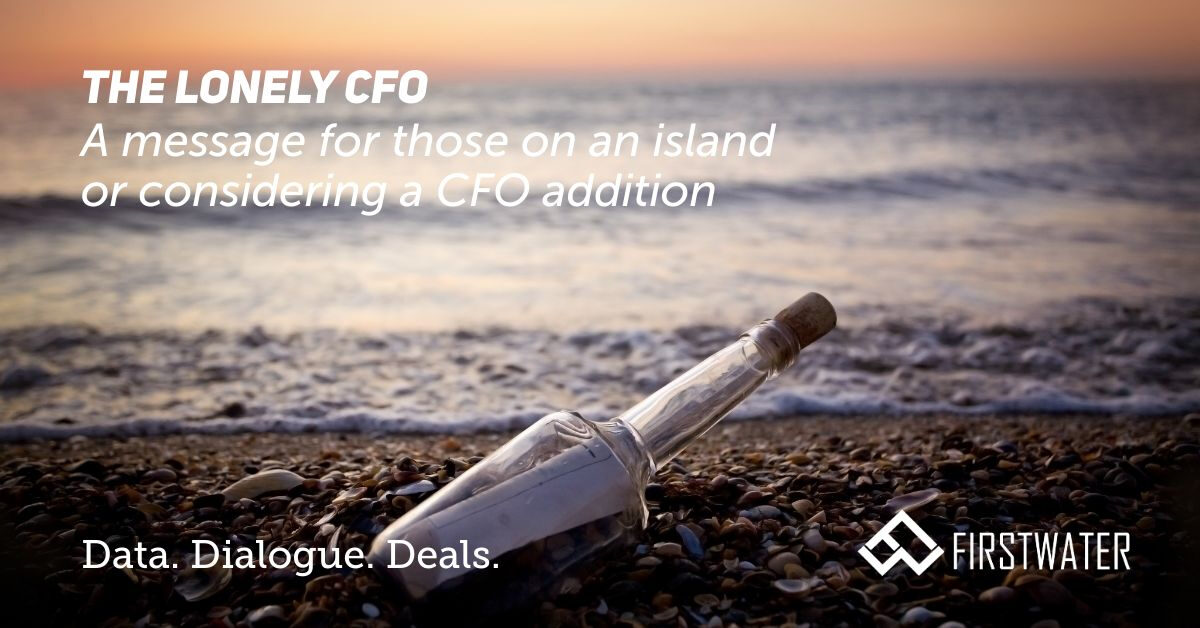Financial leaders in small and midsized businesses (SMBs) have it tough. SMBs have it even tougher in that they don’t often have financial leaders. This is a post for CFOs, businesses under $100 million in revenue considering a CFO, and leaders who want more out of their finance function.
Adding a CFO to your team for the first time is a meaningful event. Not only is it a premium and costly hire, but for many SMBs it is also the passing of financial trust and responsibility into the hands of somebody other than the business owner.
Let’s put aside the conversation of what is a true CFO. Many small companies call their head accountant the CFO by default, even if it’s a bookkeeper. Here, we’ll treat it as the following – a senior leader in the business responsible for accounting, treasury, financial planning and analysis (FP&A), and financing/transaction processes (corporate finance or corporate development).
Compared to larger companies, SMB CFOs have a problem. They’re lonely. Larger organizations have dedicated teams across each of those four functional silos. SMB CFOs may only have a staff accountant or two. This may cover most of accounting and treasury, but often puts the CFO on an island for FP&A and corporate development. We call this leader a “Lonely CFO” which comes with a number of hazards impacting both the CFO and the business. Below we’ll cover four topics, and end with a solution (sanity) for Lonely CFOs.
24 Hours in a Day
Businesses expect a CFO to deliver. Typically one of the highest compensated members of the team, the CFO is paid to be a strategist and leader.
Yet, when compared to larger organizations, the Lonely CFO doesn’t have much support. Finance professionals (FP&A and corporate development) are expensive. Without the efficiency of the full team “stack” – for FP&A it would be a VP Finance, FP&A Manager, and Business/Data Analysts – these duties flow upstream to the CFO or simply don’t happen.
This partially turns the Lonely CFO into a processor, spending time in spreadsheets that could otherwise be spent in and on the business. Even if the Lonely CFO can do it all, it typically isn’t the highest and best use of his/her time. With no support, these CFOs work harder and longer to get the information and tools they need to help drive the business. There are only 24 hours in a day.
Multiple Hats as Fashion Faux Pas
Team members often wear many hats in SMBs, often characterized as a strength and fashionable feature of entrepreneurial organization. However, when it comes to finance and FP&A, this is often a faux pas.
When there is no CFO or the CFO has no support, others within the team are often asked to provide information, reporting, and forecasting insights. This is how you get your operations leader cutting and pasting data and building some wonky charts, time that might better be spent managing team members and driving operational improvements.
Typically, these team members do not have data transformation, business intelligence, and/or financial modeling training. The result is manual, error-prone processes that take too much time, can only be managed by one individual in “their spreadsheet”, and require ongoing auditing to ensure accuracy.
Often, thousands of man hours a year can be saved by centralizing these processes in the hands of those with specific training. Wearing too many hats can be a bad look, and the closet is only so big.
Process Eats Software for Lunch
Maybe software is the answer to a limited team? More and more options are available at lower and lower price points. While optionality has its positives, it can also be a dangerous carrot.
If the data capture going into the software has gaps, usefulness is limited. The ol’ garbage in, garbage out concept. For most SMBs, these software options write checks that the business can’t cash. Somebody has to be on data discipline and ongoing utilization…things that may make the Lonely CFO even more lonely in shouldering the load.
Most SMBs already have the tools in place to build what they need, they just don’t have the horsepower to design, develop, and maintain. While it is tempting to try and order this off the menu, process eats software for lunch.
The Need for Speed
Some Lonely CFOs do have a number of the pieces in place. Now it’s about striving toward the mystical “best practices” and perhaps some individual sanity and quality of life improvements. If you’re already stronger, now it’s time to get faster.
Forecasts that take too long to develop or update are stale. If the data isn’t available, or processing takes days, critical time is lost to take action. There’s a real cost to those delays.
Speed has other advantages as well. The faster the turnaround time, the more scenarios that can be built, and the team can have and process more information when planning and making decisions. Many SMB leaders are good at managing on intuition, but who doesn’t want the additional confidence of recent data and the knowledge of the impact of multiple outcomes? The right resources and processes deliver the speed you need to succeed.
Managed FP&A
There is a solution to CFO loneliness. It’s Managed FP&A. Customized reporting, business intelligence, and forecasting tools and processes available on a done-for-you basis. Project consulting solutions don’t make much sense when there isn’t an internal team for deliverable hand-off. Even with the resources to add an additional internal finance professional, process and turnover risk is created versus tapping into a recurring team-based approach with defined methodologies. Plus, with a flat fee model, the FP&A function can be developed and maintained for less than the cost of a single mid-level finance professional.
There’s no reason to be lonely, we’re here for you. Reach out to one of our team members to learn more about First Water, Managed FP&A, and the innovative Relational Finance model that enables SMBs to efficiently tap into FP&A and Corporate Development expertise.
Let’s Start a Dialogue




